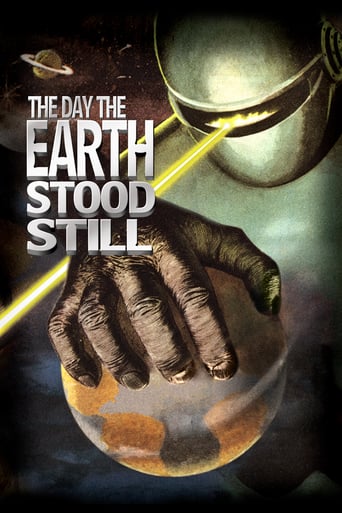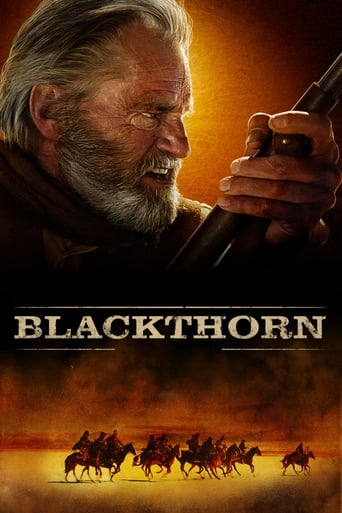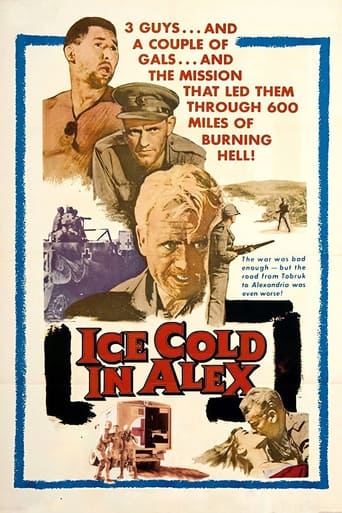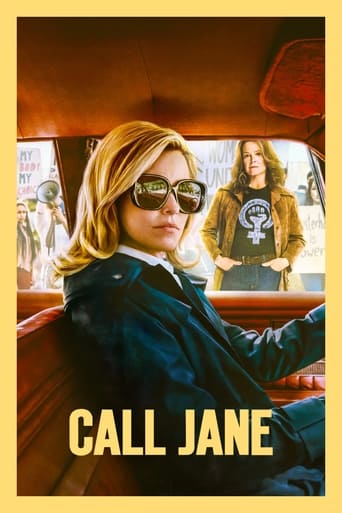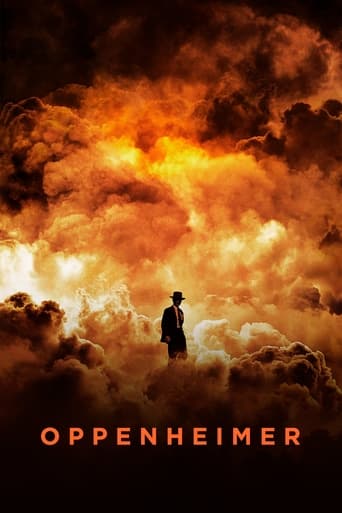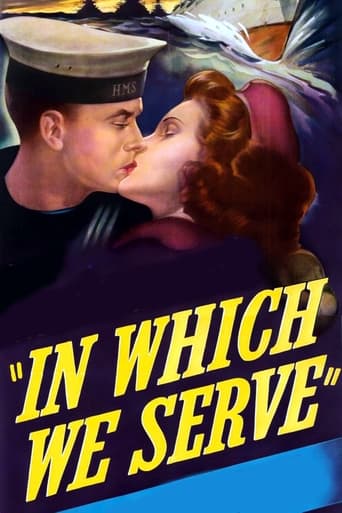


In Which We Serve
The story of the HMS Torrin, from its construction to its sinking in the Mediterranean during action in World War II. The ship's first and only commanding officer is Captain E.V. Kinross, who trains his men not only to be loyal to him and the country, but—most importantly—to themselves.
-
- Cast:
- Noël Coward , John Mills , Bernard Miles , Celia Johnson , Kay Walsh , Joyce Carey , Michael Wilding


Similar titles
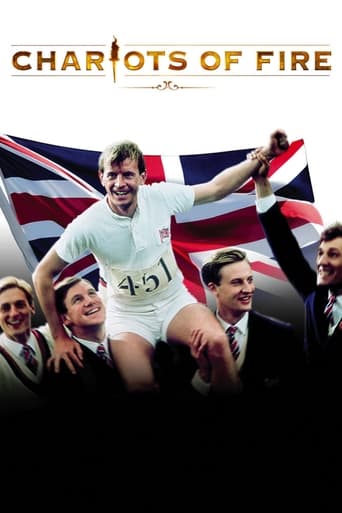
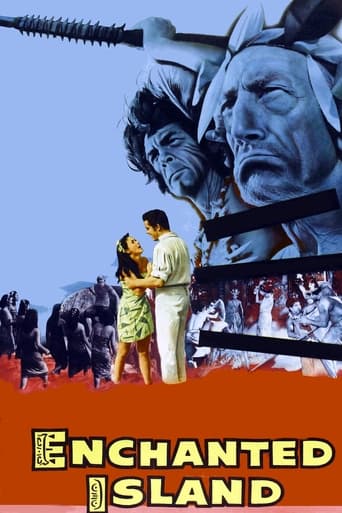







Reviews
Pretty Good
Exactly the movie you think it is, but not the movie you want it to be.
The joyful confection is coated in a sparkly gloss, bright enough to gleam from the darkest, most cynical corners.
While it doesn't offer any answers, it both thrills and makes you think.
A morale boosting wartime film and an epitome of the British stiff upper lip. The British destroyer might well have been a rival to its seamans' wartime sweethearts, but it also puts it plainly that they do it all for what lies back in Blighty. It's stagey, jaunty heroism of Coward, and sentimentality, and old fashioned outlook doesn't diminish the satisying drama. But for some key sequences, the overall direction credit goes to film editor and debut director David Lean.
The purpose of this movie from 1942 was to raise the morale on the British home front during World War II and it achieves this objective in a superb piece of film-making that drew on the virtues that made Britain one of the toughest and most courageous countries in history. Loyalty, devotion to duty, the stiff upper lip in the face of tragedy, deference to authority, and the obligation of those in authority to their subordinates were considered the foundation of a stable country. In a series of flashbacks after a British naval ship is attacked, the movie reinforces the importance of these virtues and of each man and woman to the war effort.David Lean made his directorial debut under the guidance of Noel Coward, one of the deans of British stage and screen. The movie presents a number of young actors who went on to notable acting careers: John Mills, Bernard Miles, Richard Attenborough. Coward was the ship's captain and carries out his role, not only with the obligatory noblesse oblige, but with genuine affection for the men he leads. Celia Johnson, his wife, also rises to the occasion and in one memorable speech to a group of guests, makes known that she must share her husband's love with the ship he commands. Of course, she went on to several major roles, including Brief Encounter, another quintessential British movie in 1946. This movie is a textbook example of how the British expected their people to carry out their duty in the face of adversity. It is a pleasure to watch with its excellent dialogue and acting. It is definitely not the movie one would expect to be made in 2011 but it has style and grace, elements sadly lacking in many of today's movies.
"In Which We Serve" is a great movie about World War II, England's entry into the war, the war's toll on people at home, and sea battles and survival. As such, it is a marvelous character study of the culture that was England at the time, running the gamut of social classes. The film covers about three years, from the launch of a new destroyer before Britain enters the war after Germany invaded Poland in 1939. The story unfolds in three ways. First, through the eyes of several men assigned to the ship. The captain, a chief, a regular seaman and others survive the sinking of their ship during the battle of Crete in mid- 1941. On their raft in the Mediterranean, each has flashbacks to times at their homes, with families and of loved ones. Second, we see scenes of their families at home enduring the long waits and then the Battle of Britain and German bombings. Third, we see the men in service on the ship in battle with enemy ships and convoys and in the rescue of British troops from Dunkirk in mid-1940.This film has a fairly large cast of people with significant parts, and all perform with excellence. In various scenes, I felt right a home as though I were a member or welcomed friend or guest of the families or groups. Others have commented on the stiff upper lip of the Brits, portrayed so well by all in this film. I only add that one can get a sense of the heroism in this, in each person doing his or her part to help keep some sanity and not letting things fall apart. And, the excellent script by Noel Coward, and directing with the excellent acting only brings the audience more into the emotion of the moments so that we feel and care deeply for the people. What is dated, if not history? One of the great values of film, it seems, is that it gives us a record of history. Any story put on film in the time in which it takes place, is naturally dated. But that gives us a picture, a few years later and decades into the future, of what the life and times and culture and people were like at that point in history. And that only enhances the value of older films, it seems to me, in helping later generations better learn about and understand the past. At least for those people who don't mind watching, enjoying and learning from films produced in the past, about lives and times of the past.This film is a strikingly rich and seemingly honest portrayal of its period, the war, the life around naval families of the time, and of British people and society. It was produced right in the middle of World War II, when the outcome was far from certain. While it portrays the strength of the British people in persevering, with their stiff upper lips, it also shows the reality and horrors and loss of war. And, it does all that at a time when it will be shown in theaters in England and abroad. We might call it "real" time, today. "In Which We Serve" is a classic that will be around well into the future. I highly recommend it.
It's ironic indeed that in Noel Coward's greatest screen role he played a part so atypical of what we expect from that most witty and erudite of artists. There's a lot good in In Which We Serve, but if you are expecting Coward bon mots, skip this film.Whatever else Coward was, he was one patriotic British citizen who loved his country and wanted to do his bit in World War II. The incident in which In Which We Serve is based on what actually happened to the the destroyer HMS Kelly in 1941 off Crete which was sunk after taking a few of the enemy with her. The ship was commanded by one Louis Mountbatten of the royal family and a good friend of Coward's.Coward's character while not a member of the royal family is still of the upper crust of British society. Mountbatten when war broke out used his considerable royal connections to get into a combat assignment when war broke out. The sequences in which Coward's ship is sunk and the actions of Coward and the crew hews pretty close to what happened to Mountbatten and the men of the Kelly.While we Coward and his survivors clinging to life rafts and bits of wreckage, the audience gets a series of flashbacks revolving around three men, Coward, CPO Bernard Miles, and Seaman John Mills. We see them at peace and at war with the women they are involved with who are Celia Johnson, Joyce Carey, and Kay Walsh. This was total war for Great Britain, something until 9/11 I don't think Americans could fully appreciate. While the men are at sea, the women live under threat and fact of bombardment by air. Their scenes are every bit as important as the battle scenes at sea, showing a people totally mobilized.In small roles you can find such people as James Donald, Michael Wilding, and Richard Attenborough all part of the crew. Attenborough in particular makes a vivid impression in his part.The Earl of Mountbatten made a series of televised memoirs in the early seventies that didn't reach American television until after his assassination in 1979. It was about 10 episodes and they dealt with all facets of his career. Before he retired in fact he became the First Sea Lord of the British Navy. But one episode dealt with the sinking of the HMS Kelly and the men of the Kelly who survived year after year got together for a remembrance. Some footage was shown of one of the gatherings. I wonder if they still do that and how many men are left from the ship survivors.In fact it's altogether fitting and proper that this review be dedicated to Lord Louis Mountbatten who not without controversy served his country well and faithfully throughout a long a productive life. And of course this review is also dedicated to the brave men of the HMS Kelly, those that have passed on and those who might still survive. They and the other members of the Royal Navy kept their country from invasion for almost a thousand years and in the case of World War II kept the world from a totalitarian nightmare.And they couldn't have a better film than In Which We Serve to perpetuate the memory of their deeds.


